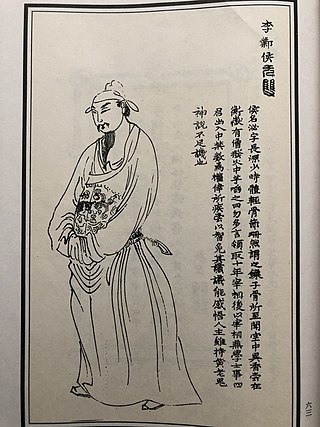
The Chu–Han Contention (楚漢相爭), also known as the Chu–Han War (楚漢戰爭), was an interregnum period in ancient China between the fall of the Qin dynasty and the establishment of the Han dynasty. After the third and last Qin ruler, Ziying, unconditionally surrendered to rebel forces in 206 BCE, the former Qin Empire was divided by rebel leader Xiang Yu into the Eighteen Kingdoms, which were ruled by various rebel leaders and surrendered Qin generals. A civil war soon broke out, most prominently between two major contending powers – Xiang Yu's Western Chu and Liu Bang's Han. Some of the other kingdoms also waged war among themselves but these were largely insignificant compared to the main conflict between Chu and Han. The war ended in 202 BCE with a Han victory at the Battle of Gaixia, during which Xiang Yu committed suicide after making a last stand. Liu Bang subsequently proclaimed himself emperor and established the Han dynasty as the ruling dynasty of China.

Xiang Yu, born Xiang Ji, was the Hegemon-King of Western Chu during the Chu–Han Contention period of China. A noble of the Chu state, Xiang Yu rebelled against the Qin dynasty and became a prominent warlord. He was granted the title of "Duke of Lu" (魯公) by King Huai II of the restoring Chu state in 208 BC. The following year, he led the Chu forces to victory at the Battle of Julu against the Qin armies led by Zhang Han. After the fall of Qin, Xiang Yu was enthroned as the "Hegemon-King of Western Chu" (西楚霸王) and ruled a vast area covering modern-day central and eastern China, with Pengcheng as his capital. He engaged Liu Bang, the founding emperor of the Han dynasty, in a long struggle for power, known as the Chu–Han Contention, which concluded with his eventual defeat at the Battle of Gaixia and his suicide. Xiang Yu is depicted in the Wu Shuang Pu by Jin Guliang.

Bufotalin is a cardiotoxic bufanolide steroid, cardiac glycoside analogue, secreted by a number of toad species. Bufotalin can be extracted from the skin parotoid glands of several types of toad.

The Chu ci, variously translated as Verses of Chu, Songs of Chu, or Elegies of Chu, is an ancient anthology of Chinese poetry including works traditionally attributed mainly to Qu Yuan and Song Yu from the Warring States period, and also a large number of works composed several centuries later, during the Han dynasty. The traditional version of the Chu ci contains 17 major sections, anthologized with its current contents by Wang Yi, a 2nd-century AD librarian who served under Emperor Shun of Han. The early Classical Chinese poetry is mainly known through the two anthologies the Chu ci and the Shi jing.
Jiu Zhang is a collection of poems attributed to Qu Yuan and printed in the Chu Ci.

Seven Swords is a 2005 wuxia film produced and directed by Tsui Hark, starring Donnie Yen, Leon Lai, Charlie Yeung, Sun Honglei, Lu Yi and Kim So-yeon. An international co-production between Hong Kong, China, South Korea and the Netherlands, the story is loosely adapted from Liang Yusheng's novel Qijian Xia Tianshan and is completely unrelated to the novel except for some characters' names. Seven Swords was used as the opening film to the 2005 Venice Film Festival and as a homage to Akira Kurosawa's 1954 film Seven Samurai.
The Grand Chancellor, also translated as counselor-in-chief, chancellor, chief councillor, chief minister, imperial chancellor, lieutenant chancellor and prime minister, was the highest-ranking executive official in the imperial Chinese government. The term was known by many different names throughout Chinese history, and the exact extent of the powers associated with the position fluctuated greatly, even during a particular dynasty. During the Six Dynasties period, the term denoted a number of power-holders serving as chief administrators, including zhongshun jian, zhongshu ling, shizhong, shangshu ling and puye.
Zhang Yi was a Chinese military strategist and philosopher. He was born in the Wei state during the Warring States period of Chinese history. He was an important strategist in helping Qin to dissolve the unity of the other states, and hence pave the way for Qin to unify China. He was an advocate of horizontal alliance, unlike Su Qin; both were adherents of the School of Diplomacy.

The Battle of Julu was fought in Julu in 207 BC primarily between forces of the Qin dynasty and the insurgent state of Chu. The Qin commander was Zhang Han, while the Chu leader was Xiang Yu. The battle concluded with a decisive victory for the rebels over the larger Qin army. The battle marked the decline of Qin military power as the bulk of the Qin armies were destroyed in this battle.
Zhang Sixun was a Chinese astronomer and mechanical engineer from Bazhong, Sichuan during the early Song Dynasty. He is credited with creating an armillary sphere for his astronomical clock tower that employed the use of liquid mercury. The liquid mercury filled scoops of the waterwheel would rotate and thus provide the effect of an escapement mechanism in clockworks and allow the astronomical armillary sphere to rotate as needed.

The China women's national volleyball team represents the People's Republic of China in international volleyball competitions and friendly matches governed by Chinese Volleyball Association. They are one of the leading and most successful squads in women's international volleyball, having won ten championships titles in the three major international competitions of volleyball, including five World Cups, two World Championships and three Olympic titles. The current head coach is Cai Bin.

Arenobufagin is a cardiotoxic bufanolide steroid secreted by the Argentine toad Bufo arenarum. It has effects similar to digitalis, blocking the Na+/K+ pump in heart tissue.

Li Bi or Li Mi, courtesy name Changyuan (長源), formally the Marquess of Ye County (鄴縣侯), was a Chinese political and military strategist during the Tang dynasty. Li was a trusted advisor and close friend to Emperor Suzong of Tang, whom he aided in suppressing the An Lushan Rebellion, and later served as chancellor and chief civil official under Emperor Dezong. An accomplished man of letters, Li was a dedicated Taoist practitioner who cut an unusual figure at court, disentangling himself from political intrigue by leading an eremitic lifestyle and often eschewing high office to serve as personal counsellor to Emperor Suzong and his successors, Emperor Daizong and Emperor Dezong. Li's strategies helped stabilize the Tang state during a chaotic era marked by rebellion, warfare, and tension with foreign powers, though his influence and perceived eccentricity drew criticism from contemporary rivals and some traditional historians. Li is one of the 40 prominent figures memorialized in the Wu Shuang Pu by Jin Guliang.
The molecular formula C24H32O6 (molar mass: 416.50 g/mol, exact mass: 416.219889) may refer to:

1-Androstenedione, or 5α-androst-1-ene-3,17-dione, also known as 4,5α-dihydro-δ1-4-androstenedione, is a synthetic androgen and anabolic steroid. It is a 5α-reduced isomer of the endogenous steroid 4-androstenedione and acts as an androgen prohormone of 1-testosterone (4,5α-dihydro-δ1-testosterone), a derivative of dihydrotestosterone (DHT).
Da Chu was a short-lived Chinese dynasty in 1127 ruled by Zhang Bangchang (1081–1127), a puppet emperor enthroned with the support of the Jurchen-led Jin dynasty. The dynasty was abolished scarcely a month after its formation.

The China men's national volleyball team represents China in international volleyball competitions and friendly matches, governed by Chinese Volleyball Association. The team competed twice in the Olympic Games, finishing in eighth place at the 1984 Summer Olympics in Los Angeles, California, and fifth place in the 2008 Summer Olympics at home in Beijing. China have been consistently competing the FIVB World Championship, with a best of seventh place in both 1978 and 1982. On a continental level, China won three gold medals at the Asian Games, in 1986, 1990 and 1998. China also won 3 gold medals at the Asian Championship in 1979, 1997 and 1999. The team now ranks 26th in the FIVB World Rankings and the current head coach is Wu Sheng.

General and I is a 2017 Chinese television series based on Feng Nong's novel A Lonesome Fragrance Waiting to be Appreciated. Directed by Ju Jueliang and written by Zhang Yongchen, the series stars Wallace Chung, Angelababy, Sun Yizhou and Gan Tingting. General and I aired on Hunan Television from 2 January to 10 February 2017.
The Fengtian clique's Zhili Army was a Chinese Warlord Era fighting force that controlled the Republic of China's Zhili province from 1924 until 1928, with the exception of a few months in 1925/26. Not related to the Zhili clique, it instead originated as Fengtian Second Army and operated as part of the Fengtian clique's armed forces. It was led by two successive Fengtian warlords, Li Jinglin and Chu Yupu, who always followed the orders of Zhang Zuolin, the Fengtian clique's overall leader. Although the Zhili Army's quality declined after 1925, it distinguished itself in numerous battles until it was disbanded in 1928 after being defeated by the National Revolutionary Army in the Northern Expedition.

Zhang Bangchang, was a puppet ruler of Da Chu and a prime minister of the Song dynasty. He was executed by Emperor Gaozong of Song after he surrendered.












